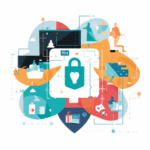
Data plays a critical role in protecting election integrity and ensuring cybersecurity, with the growing reliance on digital systems and the increasing sophistication of cyber threats making data-driven strategies more essential than ever.
Today, we have a fascinating discussion lined up, as Val and Alan, my fantastic co-hosts, join me to explore the role of data in cybersecurity and election integrity. Val, with her analytical mindset, will help us delve into the technical aspects, while Alan, our intuitive and opinionated storyteller, will guide us through the societal implications.

The Role of Data in Cybersecurity and Election Integrity
Safeguards
Fede: Val, can you kick things off by explaining how data is used to safeguard election integrity?
Val: Absolutely, Fede! Ensuring election integrity is a crucial aspect of any democracy, and data plays a key role in this process. For instance, voter registration data helps maintain accurate voter rolls, while data analysis is used to identify and prevent potential voter fraud. Additionally, cybersecurity measures are implemented to safeguard voter data and protect the digital systems used during the election process.
Alan: And let’s not forget about the growing threat of cyberattacks on election infrastructure. Data-driven cybersecurity measures are essential for detecting and defending against these attacks, ensuring that elections remain secure and free from external interference.
Challenges
Fede: Excellent point, Alan. So, what are some challenges we face when using data to protect election integrity and cybersecurity?
Alan: One major challenge is the sheer volume of data involved, which can make it difficult to identify and respond to threats in a timely manner. Another challenge is the increasing sophistication of cyber threats, which requires constant vigilance and adaptation of data-driven strategies.
Val: That’s right, Alan. And to address these challenges, we need a combination of advanced data analytics, robust cybersecurity measures, and collaboration between government agencies, private sector partners, and international allies.
Strengthening Election integrity
Fede: So, what can be done to further strengthen the role of data in cybersecurity and election integrity?
Val: Investing in research and development of advanced data analytics tools and cybersecurity technologies is crucial. Additionally, promoting transparency and information sharing between relevant stakeholders can help identify and address potential vulnerabilities more effectively.
Alan: And it’s essential to raise public awareness about the importance of cybersecurity and election integrity, ensuring that citizens understand the risks and are equipped to protect their personal information and participate in the democratic process securely.
Conclusion
Fede: Thank you, Val and Alan, for shedding light on this important topic. To wrap up, let’s remember that protecting election integrity and ensuring cybersecurity is an ongoing, data-driven effort that requires collaboration, innovation, and vigilance.
To our listeners, if you have any thoughts on this topic or suggestions for future episodes, don’t hesitate to get in touch with us at Datatunnel. Make sure to follow us on LinkedIn and Twitter for more data politics insights. Thanks for tuning in!
Resources
- Election Integrity | Freedom House
- Deepening democracy: why elections with integrity matter (theelders.org)
- How to ensure election integrity and accuracy – 3 essential reads (theconversation.com)
- Measuring Electoral Integrity around the World: A New Dataset | PS: Political Science & Politics | Cambridge Core
- Data and the Future of Political Campaigning